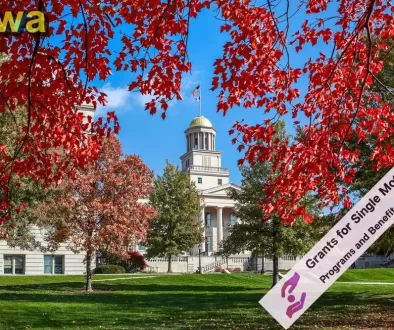Grants for Single Mothers in Connecticut
Even though Connecticut is currently one of the richest states in the country, single mothers still need the support of the local government. Connecticut has several programs at the local level, created by the federal government, from non-profit organizations to educational institutions, all of them look forward to helping the population in need from this state.
In this article, you will find a list of programs available to single mothers in Connecticut and how to apply to them:
Education Grants For Single Mothers
In Connecticut, there are several programs that were created to help single moms continue their studies after having a baby. Connecticut has the Office of Higher Education that seeks to advance the promise of post-secondary education for all its state residents, and to advocate on behalf of students, taxpayers, and the post-secondary schools and colleges which fall under its purview. The Connecticut’s Office of Higher Education offers grants and scholarships for single mothers that do not have to be paid back. Some of them are:
Pell Grant:The Connecticut Pell Grant is used for attending college. You can use this grant at any college in Connecticut if they participate in the Federal Student Aid Program. To be eligible for this grant you:
-
- You must be an undergraduate or participating in an eligible post-baccalaureate teaching certification program. Students who have already received their bachelor’s degree or are working on a graduate degree are not eligible for the Pell Grant.
- You cannot be incarcerated.
- You must have financial need.
- Your Expected Family Contribution must be under $3,850.
- As with all student aid programs, you must be following satisfactory academic progress at the school you are attending.
To apply for the Pell Grant you must complete the FAFSA application. You will automatically be in the running for the grant when you file the FAFSA.
Supplemental Educational Opportunity Grant (SEOG):
Federal Supplemental Educational Opportunity Grants (SEOG) are offered to eligible full-time undergraduates with exceptional financial need (typically Federal Pell Grant recipients) whose FAFSA has been received by the federal processor. They do not require repayment. These funds are limited and are awarded based on financial need and fund availability to students pursuing their first undergraduate degree.
TEACH Grant:A Teacher Education Assistance For College and Higher Education (TEACH) Grant is different from other federal student grants because it requires you to take certain kinds of classes in order to get it, and then do a certain kind of job to keep the grant from turning into a loan.
As a condition for receiving a TEACH Grant, you must sign a TEACH Grant Agreement to Serve in which you agree to (among other requirements) teach
-
- in a high-need field;
- at an elementary school, secondary school, or educational service agency that serves students from low-income families; and
- for at least four complete academic years within eight years after completing (or ceasing enrollment in) the course of study for which you received the grant.
Governor’s Scholarship Program:This program helps students in need of financial aid. The people with the greatest need will receive the highest priority. The amounts range from $800 to $5,000 for part-time or full-time enrollment. To apply, fill out a Free Application for Federal Student Aid (FAFSA) to see if you qualify. For more information, please contact (860) 947-1848 or via email gsp@ctohe.org
Rental Assistance Program (RAP)
The Rental Assistance Program (RAP) is a state-funded program that helps families with low-incomes afford safe housing in the private market. Eligible participants who receive RAP certificates are free to choose their own rental housing, including apartments, townhouses, and single-family homes. Certificates are issued by a local housing authority.
Once approved, the local housing authority determines a maximum allowable rent, which limits the amount of rent a tenant may pay after signing a lease with their landlord. The maximum allowable rent is generally calculated based on the amount needed to rent a moderately-priced dwelling in the local housing market.
Recipients of RAP certificates have the freedom to choose the rental housing and location which best suits their needs. Housing units must meet the quality and safety standards outlined by the local housing authority before the residence can be approved.
Care 4 Kids
Care 4 Kids helps low to moderate income families in Connecticut pay for childcare costs. This program is sponsored by the Connecticut Office of Early Childhood. To participate in the program, there are certain eligibility requirements for parents and children;
– Families must reside in Connecticut; be working or attending a temporary family cash assistance (Jobs First) approved education or training activity; and meet the program’s income requirements.
– Children must reside in Connecticut; and be under age 13, or if the child has special needs, be under age 19.
Healthcare for UninSured Kids and Youth (HUSKY)
Connecticut has a HUSKY department for single mothers and their children. Healthcare for UninSured Kids and Youth (HUSKY) http://www.huskyhealth.com/ is a public healthcare program that covers adults without dependents, children, and the elderly if they are eligible. To apply, you can do it directly on the HUSKY website, by phone at 1-855-805-4325, or in person at a local Department.




